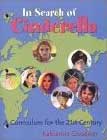
Cinderella:
345 Variants
by Marian
Roalfe Cox
SurLaLune's
Cinderella Area
SurLaLune Fairy Tales Main Page
246
Nerucci, Gherardo, Sessanta Novelle popolari Montalesi (circondario di Pistoia). Firenze, 1880. Pp. 280-285. Novella XXXII. (Narrated by Luisa, widow of Ginanni.)
"LA RAGAZZA SERPE."
ABSTRACT
Ill-treated heroine (by step-mother and step-sister)--Tasks: spinning--Task-performing animal (cow)--Step-sister, learning that one of the cows spins hemp, takes them to pasture, but beats them, and hemp gets tangled--Heroine sent to steal gallonzoli for step-sister; pulls up turnip, releasing five toads, four of whom begift her with beauty; but one, whom she has let fall, curses her. If sunlight falls on her, she shall become serpent, and only regain human form if thrown in fire--Prince would wed heroine; sends closed carriage to fetch her. Step-mother bribes coachman to admit sunlight--Transformation of heroine--Feast at palace. Brushwood to heat oven conceals ser of heroine--Re-transformation of heroine--Recognition--Happy marriage.
TABULATION
(1) Poor man loses young wife, who leaves lovely baby called Rosina. He marries again, and second wife bears ugly child, called Assunta. Children grow up, and go to school together. Assunta, who is ill-tempered, tells mother that people they meet say how black and ugly Assunta is, how charmingly rosy and beautiful is Rosina. "I won't go with her any more!" Mother tells her the people are quite right; her daughter is black, because her own skin is dark. She should not heed such remarks. Assunta says, "You are against me, too!" and begins to weep. Mother asks what will comfort her. "Send Rosina to mind cows, and give her a pound of hemp to spin. If she comes home at night with cows unfed and hemp unspun, hit her with a stick, and make her ugly."-- (2) Mother, yielding reluctantly to daughter's caprice, calls heroine, sends her to cut fodder for the cows, and gives her hemp to spin. Rosina goes sad at heart, saying on the way, "My cows! I-low am I to cut grass for you, when I have got all this hemp to spin?" One of the cows suddenly turns, and says, "Don't be uneasy, Rosina! you mow the grass for this evening, and we will spin the hemp and wind it into skeins. You have only to say:
'Dear little cow, my little cow!
Spin with your mouth, spin for me now,
Wind with your horns, again, again,
Quickly make it into a skein.'"
When heroine returns at dusk with bundle of grass and
hemp, spun and wound, Assunta is enraged.-- (3) She persuades mother to
give Rosina twice the quantity of hemp next day, and to beat her to death
if it is not spun. Rosina tells cows of impossible task, and same cow
replies as before. Assunta is terribly angry when Rosina returns at night
with task done, and asks how on earth she has managed it. Rosina says
the cows helped her.--
(4) Assunta tells mother that Rosina shall do housework to-morrow, and
she will go with cows and do the spinning. She hits their tails with a
stick as she follows them. Arrived at the fields, she puts the hemp on
their horns, and then beats them so vigorously, because they do nothing
with it, that cows toss their heads till hemp is all tangled. When she
returns at night, with no bundle of hay, but with cows knocked about and
hemp in a muddle, mother asks what she has been doing. Assunta says cows
were unruly, and she had to beat them. Mother reproves her for bad temper.--
(5) After some days, Assunta, always trying to harm Rosina, says to mother,
"I want to eat some gallonzoli. Send Rosina to-night to pick some
from peasant's field." Rosina objects to being made to steal, but,
as Assunta insists, she goes to pick the gallonzoli, and finds a turnip,
which she tries to pull up. She tugs and tugs; at last turnip comes out,
and underneath it are five tiny little toads-- a nest of toads, in fact.--
(6) Rosina takes them in her hands to put into her lap, when one slips
through her fingers, and, in trying to save it, she breaks its leg. "Poor
thing! I didn't mean to hurt you." But the other toads are very comfortable
in her lap, and are considering how they shall repay girl's kindness.
"She shall be the fairest in the world, and shall shine like the
sun when the sun has set." But the lame toad exclaims, "I mean
to see justice done! She should take care how she throws a fellow down
and injures him. As a punishment she shall become a serpent when she sees
the sun, and only return to a girl if she gets into the oven and is scorched."--
(7) Rosina returns home with the allonzo1i, half glad, half sad. Mother
and Assunta see how much more lovely she has become, and how she shines
like the sun, so that near her one can see by night as well as by daylight.
She tells them all that has happened, and begs them to do her the kindness
never to send her out in the sun, lest she become a serpent. So Rosina
never goes out, except at night.-- (8) Once, whilst she is sitting at
her window singing, king's son goes by whistling, and, turning his eyes
to where he sees a great light, beholds this girl, almost blinding to
look upon. He is astonished to see so much loveliness in such a poor hut,
and goes in and asks questions, till Rosina at length tells of her misfortune.
In spite of this he means to marry her, though mother says girl will get
him into nice trouble should she turn into a serpent. Prince says that's
his affair, he shall send closed carriage for her, so that sun shall not
hurt her, and he will pay mother for bringing her to palace.-- (9) Mother
and Assunta, compelled to obey, make preparations for Rosina's departure
wills an ill-grace. Mother accompanies her in closed carriage, which has
only one little aperture in the top to admit air at pleasure. Behind carriage
stands the driver (as they used at one time in Florence), with plumes
in his hat, a gorgeous livery, and a sword dangling at his side. Mother
says to him, "I'll give you ten paoli if you'll open the hole at
the top when the sun shines. I can't stand being suffocated like this."
He agrees to do so, and when mother gives him a sign, just at noon, when
the sun is shining in all its strength, he opens the shutter, letting
a ray of sunlight fall on Rosina's head, transforming her into a serpent,1
which glides away into the wood. When king's son finds only mother in
carriage, he weeps scalding tears, and is almost disposed to kill mother
and coachman. -- (10) In the royal palace there is a special kitchen,
and oven for cooking food for the poor. One day, cook being busy preparing
big dinner for Court guests, and wanting to make oven extra hot, puts
on the fire some fresh brushwood, brought in that morning. All at once
he sees a serpent amongst the twigs, and it is thrown right into the flames
ere he can save it. Whilst trying to drive it out at oven's mouth, all
at once a most beautiful girl emerges, naked, and shining like the sun.
Cook calls out that there is a girl in the oven, and the Court and the
king's son run to see.-- (11) He recognises Rosina, and takes her to his
room. She lives happily, and has never any thing more to fear.
NOTES
Note 53
(P. 333.) In the story of "The Golden Duck" (Gerle, Volksmärchen der Bohmen, No. v) a fairy presents a good girl with the gift that her tears shall be pearls, and the hair she combs out gold. When she grows up she is betrothed because of these gifts and of her beauty, to a count, who has heard of her from her brother. But she must never allow a single ray of sunlight to fall on her, or these magic attributes will discontinue. On the way to her bridegroom she is accompanied by her aunt and cousin, with whom she has been brought up; and once, when the aunt is opening the door of the carriage, one ray of sunlight falls on the bride, and she is instantly changed into a golden duck, which swims away. The aunt presents her own daughter to the count as the bride. (The story is a variant of Grimm's No. 135.)
The ray of light which pierces the little crack in the
door, in Grimm's story of "The
Singing, Soaring Lark," transforms the lion-prince into a dove.
In Gonzenbach's No. 32 (which has many of the incidents common to Cinderella
tales), Caterina must not go near the sea, or she will turn into a sea
serpent. In Schneller's No. 22 the heroine must beware of a ray of sunlight.
Return to place in text.
Cox, Marian Roalfe. Cinderella: Three Hundred and Forty-five Variants of Cinderella, Catskin, and Cap O' Rushes, abstracted and tabulated. London: David Nutt for the Folklore Society, 1893.
While the original text of this book is out of copyright, the special formatting and compilation available on SurLaLune Fairy Tales is copyrighted. Be aware that while the original content has been honored, page numbering, footnote numbering, redesigned charts, links, and other aspects are unique to this site's version of the text. Use at your own risk. For private and fair use educational purposes only.
©Heidi
Anne Heiner, SurLaLune Fairy Tales
E-mail: surlalune@aol.com
Page last updated February 1, 2006
www.surlalunefairytales.com










